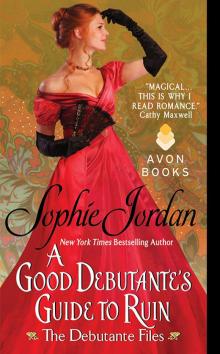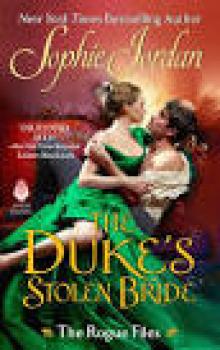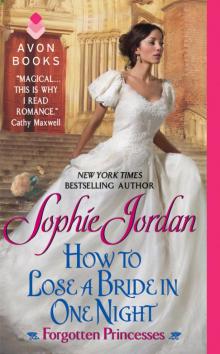- Home
- Sophie Jordan
The Duke Goes Down Page 2
The Duke Goes Down Read online
Page 2
Their neighbor to the east was one such example. Mrs. Henry had five children and a brutal husband who was never satisfied with any of her wifely efforts. She was frequently “falling down.” Mama often tended to her after these mishaps—beneath the critical eye of her husband, of course. As though he feared his wife might tell Mama the true cause of her accidents.
Imogen held her breath, waiting for Penning’s response, her shoulders tightening to the point of discomfort.
Penning chuckled lightly. “One’s disposition must be considered. A wife will not stay young forever. Looks fade and then you’re left staring across the dining table at someone you can hopefully abide.”
“And you cannot abide Miss Bates?”
“Let us just say she has the disposition of a rotten lemon.”
Imogen pulled back as though struck.
Everyone laughed. Even Amos, and she had only ever been solicitous to him.
Not just a lemon . . . but a rotten one.
“No one is telling you to marry the chit, Penning. Dalliance does not require that level of commitment.”
As though dalliance with me is a given? As though I would simply fall into his lap with wild abandon?
“There are any number of females I would rather kiss than a sanctimonious vicar’s daughter who finds it diverting to discuss the weather and the latest infestation of wheat mites.”
She dropped her hands onto her quaking knees and inhaled a pained breath.
She never knew what to talk about in his exalted presence—and wheat mites could ruin a crop. Clearly he could not be bothered with topics so beneath him.
Still holding onto her knees, she rocked slightly. It was one thing to suspect he didn’t like her and another thing to hear him say it out loud—another thing to hear him talk about her with all his friends. To hear him laugh and ridicule her to them.
She blinked her suddenly burning eyes. Rotten lemon.
The young toffs continued talking and laughing, but she could scarcely hear the rest of their words over the buzzing in her ears.
They moved on to other subjects, but she remained crouched where she was, battling anger and nausea, breathing in the aroma of cigars and wondering how long she had to suffer in silence.
She didn’t know how long she waited. It felt like hours, but it could have been minutes. Eventually their voices turned to low rumbles as they moved toward the door of the conservatory. They were leaving at last. Hinges creaked and then silence fell and she assumed they had departed. After a moment, she emerged from beneath the table and rose up into the smoky air.
They were indeed gone.
She turned and grasped the edge of the table as though drawing strength from her ruthless grip. She inhaled and beneath the lingering scent of cigars she caught a whiff of loamy fauna. Imogen looked down at her hands and noticed the small matchbook near her left pinky finger. One of them must have left it.
The door to the conservatory creaked open and she whirled around.
There at the end of the aisle, between stretching foliage, the door drifting shut behind him, loomed Penning.
He’d returned.
He’d returned and now he stared down the length of the walkway where she stood. He regarded her and there was no point in running or hiding. It was too late. She was discovered.
“I forgot my matchbook,” he declared.
“Oh.” Turning, she plucked it up from the table and faced him again, glad for the stretch of space between them. Hopefully he could not detect the way her hands trembled.
“Were you in here this entire time?” he asked mildly, a tinge of disapproval in his voice.
Disapproval? She would have none of that from him. She had done nothing wrong. At least not in comparison to him. “I was.”
“You might have announced yourself.”
“I did not wish to intrude.”
“But you wished to eavesdrop?”
“Not particularly. It was not my intention.”
“But you did eavesdrop,” he said more than asked.
“On your vile conversation?” She lifted her chin. “Yes. I heard it.”
He sighed as though afflicted. That was some irony. He was the afflicted one? After all the terrible things he had said about her in front of his friends? In front of young Amos Blankenship, no less. No doubt the duke’s words would make the rounds in the village. Everyone would look at her and think: rotten lemon.
“I suppose I should apologize then.” Clearly any apology he issued would not be sincere. He doubtlessly felt compelled as their fathers were friends.
“You should not do or say anything you do not mean. You never have to do that with me. It’s no longer necessary.” Palming the small packet of matches, she forced herself to stroll forward down the aisle toward the door—toward him—with great composure. She was proud of herself for that. Attired in the most ridiculous frock, still bruised raw from his words, she moved closer to him with a semblance of equanimity.
Upon reaching him, she stopped and held out her hand. “Here you go.”
He looked down and turned his hand over. Taking great care that they should not touch, she dropped the matches into his open palm.
“Thank you,” he murmured, all the while peering carefully at her face, as though he was searching for evidence that she was not as calm as she appeared—that she was not unaffected. He would be right if he perceived that, but God willing he would not. She did not want him to know how hurt she felt.
He knew the ribald nature of his conversation with his friends. He knew she should be scandalized and offended—and she was. She was actually fine with him knowing those things. As long as he knew she was not crushed. She would not have him know he possessed the power to hurt her.
“Pardon me.” She nodded to the door he was blocking, indicating she wanted to pass.
“Of course.” He stepped aside, still looking as though he wanted to say something. God spare her whatever lies and platitudes he would offer forth to soothe her. She did not want his sham of an apology. She would not believe him, at any rate, and he could not expect her to—not on the heels of everything she had overheard.
She was well clear of him and out the door when she suddenly stopped and looked back at him.
Bathed in sunlight, he stood in the threshold, one shoulder wedged in the doorjamb, an eyebrow lifted questioningly. And it occurred to her then. He was not sorry. Indeed, not one little bit. There was no regret in that supercilious arched eyebrow of his.
She moistened her lips, outrage bubbling up inside her. “I would just like to say . . .”
“Yes?” he prompted.
“I would have you know . . .” He continued to stare at her in patient expectation, and she blurted, “Wheat mites can be very serious and decimate an entire crop. An entire shire can suffer the ravages of wheat mites.”
That said, she turned and left him.
Perhaps she should have said something else. There were a great many things she could have said that were more stinging, but that was the one thing that had popped out from her mouth.
She had heard Penning speak unrestrainedly. Now she knew his true mind. There was no confusion. No obscurity. This particular monster no longer hid in the dark.
She’d glimpsed the real Penning, and she would never forget him or his words . . . even as she managed to avoid him in the days and years to come.
At future gatherings, she kept her distance. Greeted him as required, but said little else. An outsider looking in would think naught of it. One might remark that the vicar’s daughter was merely reserved in nature around her betters.
Only young Penning would be able to read more into her reticence. If it even occurred to him to do so. If he cared. Perhaps he recalled that long-ago lawn party and the girl in the garish pink dress who stared at him with wounded eyes. Perhaps not.
In the years that followed, young Penning attended her mother’s funeral alongside his family. Imogen was aware of him there, a tall, s
ilvery-eyed figure on the periphery, an unwanted presence amid her grief.
Two years later, on the death of his father, Imogen returned the courtesy and did the same, standing among mourners and offering stilted condolences.
Following the demise of the old duke, there was little occasion for them to interact further.
Five years passed with minimal sightings.
She heard of his exploits, of course. The young illustrious Duke of Penning spent most of his time in London, expanding his reputation as a feted nobleman about Town whilst Imogen’s life turned to that of caretaker.
She settled into spinsterhood and loyally tended to her father and the vicarage and the people of Shropshire, telling herself it was all she ever wanted. This duty was her calling.
It was enough.
Her life was one of purpose. She harbored no regrets even if, on occasion, the whisper of rotten lemon chased through her mind like a slithering snake. Especially every time she came face-to-face with Amos Blankenship in the village. That snake slithered yet.
Her single consolation was the proverb Mama had frequently chirped: As you sow, so shall you reap.
The Duke of Penning would have his turn.
She did not know when or how, but when it came for him, she would not pity him.
Chapter Two
Ten years later, 1848
The once glorious and venerable Duke of Penning sat as bold as he pleased in the first pew of Imogen’s church.
Except he was a grand duke no more.
The young nobleman had gotten his comeuppance.
The mighty had fallen from his perch and landed upon earth to mingle alongside the rest of them—even if he still happened to sit in the pew reserved for the Duke of Penning and his family.
Duke no more.
A tight little smile of satisfaction curved Imogen’s lips—until it occurred to her that she was sitting in church and harboring some decidedly less than charitable thoughts over one man’s misfortune. Not very virtuous behavior. She tried to stamp down her glee. It was not well done of her.
Her fingers tightened around the edges of her prayer book, digging into the leather, and she sent a guilty glance where the erstwhile duke sat beside his mother, looking unreservedly bored as her father pontificated from the pulpit—and any guilt she may have harbored for her less than charitable thoughts toward the man vanished.
Impudent man. Once the real duke arrived, he would then sit among the denizens of Shropshire like the mortal he was. Her smile deepened. She longed for that day. The final reckoning come to fruition. Mama had been right. As you sow, so shall you reap.
Her gaze drifted back to the front of the church. Papa stood on the other side of the altar, one hand gripping the pulpit for support. He scarcely looked up from the parchment as he haltingly read, squinting through his spectacles. She silently encouraged him. Come now, Papa. You can do it.
He was no longer the rousing orator he once had been. He had not been that in some time. Not since his last fit of apoplexy, but as long as Papa was still here with her, and he could stand up in front of his congregation and read the sermon she had written for him, then all was not lost. He still enjoyed society, and society enjoyed him. It was enough.
Imogen shifted restlessly in her pew. Penning—no, that was not correct. He had ceased to be the Duke of Penning for nigh on a year. One would think that fact would have fully absorbed into her head by now.
Mr. Butler attempted to hide his yawn behind his hand. Rude man.
Why was he even here today? He rarely ever put in an appearance at the vicarage—or Shropshire, for that matter. It was typically left to his mother to grace the hallowed confines of their country church.
To be fair, he was still glorious. Dark locks and silvery gray eyes. He was a dark angel. Imogen well knew that angels came in all shapes, however. Ever since she was a child and found herself launched into a pond on the Penning estate, choking on pond scum, the little lordling’s laughter ringing in her ears, she knew what manner of angel he happened to be.
The boy had been a devil then, and the man was no better now. A smile again threatened to overtake her lips. He would soon learn that the world no longer bowed down to him.
Papa finished and the congregation lifted as one to their feet.
Imogen collected Papa’s cane she was charged with keeping for him, and stepped out from her pew. Moving forward, she patiently held out her gloved hand for Papa to accept as he stepped down from the dais. He took his cane, gripping it with one hand and latched onto her arm with his other, leaning a significant amount of his weight on her. Fortunately she was sturdy. Helping Papa to and fro over the last couple years had developed muscles where none had previously existed.
They started down the center aisle together as the choir sang its departing hymn. Her gaze landed on Mr. Butler for a heartbeat. He wore an impatient expression, as though he could not wait to be free of this church. Imogen sniffed in disdain and snapped her gaze forward.
She and Papa took their positions just outside the double doors. Pasting a smile on her face, she nodded and smiled and greeted the denizens of Shropshire. Papa managed this part of his duties quite well. He still loved the social aspect of his role. That had not changed. He had always been a marvelous listener. He smiled and nodded and appeared wholly invested in conversations flowing around him—even if he was not quite the loquacious speaker he once was. Even if it took him a long time to arrive at his words. That did not mean he failed to appreciate the community around him.
Imogen likewise nodded and smiled and said all the right and usual things as congregants exited the church.
Thank you for coming. Have a lovely day. How is your dear grandmam? We would love to join you for tea this week. Oh, my what a splendid bonnet! My compliments on your freshly painted fence. It is the highlight of Shropshire.
The banalities ended as the last family passed through the doors and moved on. Imogen and her father turned to face the bustling churchyard.
As with every Sunday, members of the congregation lingered and mingled. There was nothing unusual with such a sight. The duke—blast it! Mr. Butler—in their midst, however? That was unusual, and highly suspect as far as Imogen was concerned.
In the last year since his disinheritance, he had not accompanied his mother to church. It was a curious thing. What brought about this development now? Why was he here? Should he not be in London leeching off his friends now that he found himself without rank and funds? At least she assumed he was without funds. She was not privy to the nature of his finances. Or perhaps now that the truth of his birth had been revealed those friends wanted nothing to do with him.
She tugged down on the brim of her bonnet so that she might survey him more inconspicuously.
He stood beneath the shady drape of a tree, adjusting his hat, looking resplendent in his blue frock coat and brocade waistcoat, his cravat impeccable beneath his chin. He still dressed in the height of fashion. At least he was fashionable by Shropshire standards. Evidently it would take more time for his state of penury to become perceptible to the outside world.
“Come, daughter.” Papa patted her gloved hand and together they stepped down the front stone walk of the church.
Mrs. Blankenship and her daughters immediately waylaid Papa. Imogen stepped to the side, largely forgotten as they started chattering excitedly about their impending house party. Their guests were very important and well-heeled people from London. The entire shire was invited to the country ball they would be hosting on the third night of their house party.
Imogen smiled as though interested in the banter, but she had no interest in balls. At nearly six and twenty, balls were no longer high on her list. Indeed, they had not been for some time.
Lifting her face, she let the rare sunlight skim over her skin with no fear of any resulting freckles. Her nose was already spotted with them. She’d been born that way. Freckled and cheeky, her mother had oft asserted.
Lowering he
r face, she allowed her gaze to roam over the inhabitants of her beloved Shropshire—or at least those who had shown up to hear her sermon today. It filled her with secret delight when people complimented Papa. No one could know they were her words—that would not go over well at all—but she knew and that was enough to make Imogen feel warm inside.
She squinted against the bright morning glare.
Mr. Butler no longer stood alone. He had moved and was now chatting with the very elegant baroness. She frowned slightly. Strange indeed. Imogen had never seen them in conversation before.
The widow was not in the first blush of youth—or even the second blush of youth. Of course she was no ancient dragon either. She had to be close to a decade older than Mr. Butler, but she was still an exceptionally handsome woman with vividly dark hair and translucent skin.
Her daughter stood near her, shifting awkwardly from slippered foot to slippered foot as her mother conversed with the former duke. The baroness touched the girl’s arm, and brought her in closer, determined, it seemed, that she participate in the conversation. Mr. Butler angled his head and listened with a rapt expression as the blushing girl murmured something.
Oh, dear. Imogen narrowed her gaze on the trio. She dearly hoped Butler had no designs on the baroness’s daughter—and that the baroness would not actually humor his designs if he did.
The young girl would soon be traveling to London for her first season. Once she turned ten and eight, she would officially be on the market. She would doubtlessly find more suitable choices there than an illegitimate scoundrel, who clearly only had interest in her dowry.
A year ago he had been living the life of a spoiled nobleman, paying no mind to the baroness or her daughter or anyone else in the village of Shropshire. He cared naught for anyone or anything save his own pleasures.
Obviously, he’d had a change of heart. The baroness was no longer beneath his notice. In fact, her daughter would now be quite the catch for the likes of him and well he knew it.

 Uninvited
Uninvited The Duke Buys a Bride
The Duke Buys a Bride Hidden
Hidden Breathless
Breathless Hell Breaks Loose
Hell Breaks Loose Wicked in Your Arms
Wicked in Your Arms The Earl in My Bed
The Earl in My Bed All the Ways to Ruin a Rogue
All the Ways to Ruin a Rogue Sins of a Wicked Duke
Sins of a Wicked Duke Beautiful Lawman
Beautiful Lawman Once Upon a Wedding Night
Once Upon a Wedding Night In Scandal They Wed
In Scandal They Wed Vanish
Vanish Rise of Fire
Rise of Fire Firelight
Firelight An Heiress for All Seasons
An Heiress for All Seasons A Good Debutante's Guide to Ruin
A Good Debutante's Guide to Ruin Fury on Fire
Fury on Fire All Chained Up
All Chained Up Foreplay
Foreplay The Scandal of It All
The Scandal of It All The Duke's Stolen Bride
The Duke's Stolen Bride Unleashed
Unleashed Reign of Shadows
Reign of Shadows The Me I Meant to Be
The Me I Meant to Be One Night With You
One Night With You How to Lose a Bride in One Night
How to Lose a Bride in One Night Tease
Tease Kissing Lessons
Kissing Lessons While the Duke Was Sleeping
While the Duke Was Sleeping Wild
Wild This Scot of Mine
This Scot of Mine Foreplay: The Ivy Chronicles
Foreplay: The Ivy Chronicles Firelight with Bonus Material
Firelight with Bonus Material The Duke Goes Down
The Duke Goes Down All The Ways To Ruin A Rogue (The Debutante Files Book 2)
All The Ways To Ruin A Rogue (The Debutante Files Book 2) Wicked Nights with a Lover
Wicked Nights with a Lover Firelight f-1
Firelight f-1 Beautiful Sinner
Beautiful Sinner Surrender to Me
Surrender to Me Scandal of It All
Scandal of It All Vanish f-2
Vanish f-2 Vanish: A Firelight Novel
Vanish: A Firelight Novel The Earl in My Bed: A Forgotten Princesses Valentine Novella
The Earl in My Bed: A Forgotten Princesses Valentine Novella